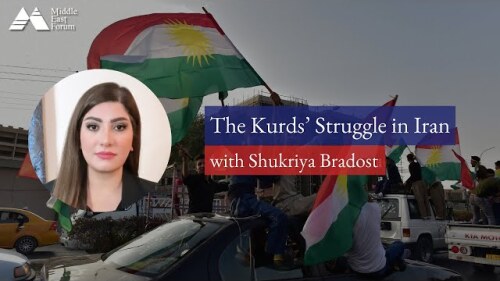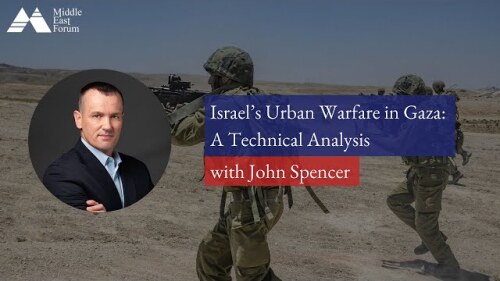|
|
Yasmine Mohammed, ex-Muslim human rights activist, author of the autobiography and memoir, Unveiled: How Western Liberals Empower Radical Islam, and founder of Free Hearts, Free Minds, an organization supporting closeted ex-Muslims from Muslim-majority countries, spoke during an August 15 Middle East Forum Webinar (video) in an interview with Benjamin Baird, deputy director of the Middle East Forum’s Islamist Watch project.
Mohammed’s secular Western childhood in Canada ended when her Egyptian mother, following a divorce, remarried and became the second wife of an Islamist who attended the same mosque. He was physically abusive to Mohammed and her siblings, demanding they adhere to strict Islamic ritual observance. Mohammed compared her mother’s acquiescence to her husband’s repressive religious pressure to that of a vulnerable “cult” member. “If you look at cults in general, single mothers are one of the main people that end up getting pulled into those systems,” she said.
Mohammed now hosts the Forgotten Feminists podcast which interviews women who escaped cult-like religious backgrounds. She explained how women like her mother were drawn into such oppressive circumstances:
They’re looking for community, they’re looking for support. They’re looking for tight bonds. Especially somebody like my mom who didn’t have her family in Canada. She didn’t have anybody to lean on, and so when you become part of a tight-knit cult, it feels comforting. It feels supportive. It feels like everybody is taking care of each other.
While attending a secular public secondary school, Mohammed alerted a concerned teacher about her stepfather’s abuse, but when her case appeared before a Canadian judge, he refused to intervene. Mohammed was shocked that the judge dismissed her case because of cultural differences. She said Canadian courts reached similar decisions in many cases based on “cultural relativism.” She believes her abuse “has nothing to do with culture. It has everything to do with religion.” The court’s refusal to help her “validated” the anti-Western biases with which she was raised — the belief that non-Muslims wanted her to “live in misery,” and that even the courts could not counter “what Allah wants ... to happen.”
Mohammed gave up hope during this “dark time” and resigned herself to a forced marriage with an Al-Qaeda terrorist.
Mohammed gave up hope during this “dark time” and resigned herself to a forced marriage with an Al-Qaeda terrorist. She devoted herself to her baby daughter but was alarmed when she overheard her husband and mother conspiring to take her infant daughter to Egypt at age five to get “fixed” through female genital mutilation. That was the point when Mohammed realized she had a responsibility to “protect” her daughter and leave the marriage and Islam before that day would come.
Today, Mohammed, a university instructor, is active with her nonprofit organization, which offers “community and support ... to one of the most vulnerable groups in the world:" ex-Muslim women who have undergone “religious trauma” and “denounced Islam,” but who live a “double life.” Mohammed said she understands through first-hand experience that being trapped in a “double-life” is “soul-rotting.” Her organization offers “psychosocial tools” for women who feel “disconnected” and isolated. Free Hearts, Free Minds is a refuge for the many women subjected to beatings and acid attacks, or threatened with “honor killings” if others discover their efforts to escape.
Mohammed’s success with her organization led her to joined the newly-established CLARITY Coalition [Champions for Liberty Against the Reality of Islamist Tyranny], another nonprofit formed to unite a diverse group from all walks of life comprised of anyone “concerned about Islam’s tyranny.”
“We’re all people that are for liberty, for enlightenment values, and against all of the tyrannical Islamist ideas ...[in] America and Europe, where those Islamist ideas are being sold as Muslim cultural things,” Mohammed said. Whether it be taking a stand against Islamist pressure to wear the hijab or burka, the CLARITY Coalition speaks out against Islamists “in media [and] in policy” to “clarify the truth and expose their lies.”
Baird said ex-Muslims face challenges from “state institutions around the world,” as well as from Islamists. He gave the example of the recent knife attack by a fundamentalist Muslim targeting ex-Muslim Salman Rushdie, the Indian-born British American novelist, who was committed at a speaking engagement in upstate New York some three-decades after an Iranian ayatollah issued a fatwa [Islamic legal ruling] against Rushdie for his writings “blaspheming” Islam.
Mohammed said she feels “compelled” to speak out and act because the attack on Rushdie is the most recent in a long line of attacks in the West.
Mohammed said she feels “compelled” to speak out and act because the attack on Rushdie is the most recent in a long line of attacks in the West, such as the murder of Theo Van Gogh in Holland and the threats against ex-Muslim human rights activist and author Ayaan Hirsi Ali. In France, the massacre of the Charlie Hebdo journalists and the beheading of teacher Samuel Paty are but two of the Islamist attacks waged by fundamentalist Muslims.
Even though the Islamist threat has spread to the West, Mohammed draws inspiration from Rushdie’s courage in living his life despite the threat that has followed him. She quoted Rushdie, saying: “Terrorism is the art of fear. So, the only way you can defeat it is by deciding not to be afraid.” Drawing strength from Rushdie, Mohammed said that “if he can do it, we can do it.” After living most of her life in fear, Mohammed said that through her activism, “I won’t let them win.” Determined she “will not let [Islamists] have ... control over my mind, over my body, over my actions ... ever again. ... And hopefully that resonates with any ex-Muslims” who hear her words.




